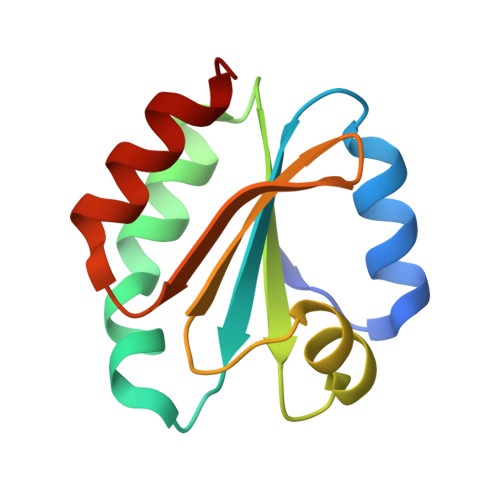Structures of the germline-specific Deadhead and thioredoxin T proteins from Drosophila melanogaster reveal unique features among thioredoxins.
Freier, R., Aragon, E., Baginski, B., Pluta, R., Martin-Malpartida, P., Ruiz, L., Condeminas, M., Gonzalez, C., Macias, M.J.(2021) IUCrJ 8: 281-294
- PubMed: 33708404
- DOI: https://doi.org/10.1107/S2052252521000221
- Primary Citation of Related Structures:
6Z7O, 6ZMU - PubMed Abstract:
Thioredoxins (Trxs) are ubiquitous enzymes that regulate the redox state in cells. In Drosophila , there are two germline-specific Trxs, Deadhead (Dhd) and thioredoxin T (TrxT), that belong to the lethal(3)malignant brain tumor signature genes and to the 'survival network' of genes that mediate the cellular response to DNA damage. Dhd is a maternal protein required for early embryogenesis that promotes protamine-histone exchange in fertilized eggs and midblastula transition. TrxT is testis-specific and associates with the lampbrush loops of the Y chromosome. Here, the first structures of Dhd and TrxT are presented, unveiling new features of these two thioredoxins. Dhd has positively charged patches on its surface, in contrast to the negatively charged surfaces commonly found in most Trxs. This distinctive charge distribution helps to define initial encounter complexes with DNA/RNA that will lead to final specific interactions with cofactors to promote chromatin remodeling. TrxT contains a C-terminal extension, which is mostly unstructured and highly flexible, that wraps the conserved core through a closed conformation. It is believed that these new structures can guide future work aimed at understanding embryo development and redox homeostasis in Drosophila . Moreover, due to their restricted presence in Schizophora (a section of the true flies), these structures can help in the design of small-molecular binders to modulate native redox homeostasis, thereby providing new applications for the control of plagues that cause human diseases and/or bring about economic losses by damaging crop production.
Organizational Affiliation:
Institute for Research in Biomedicine, The Barcelona Institute of Science and Technology, Baldiri Reixac 10, 08028 Barcelona, Spain.
















